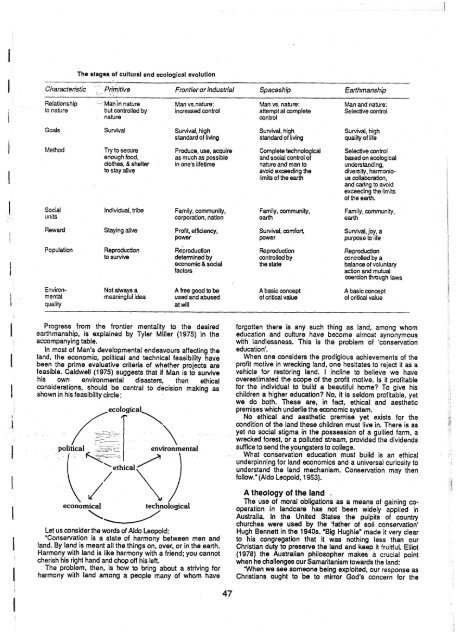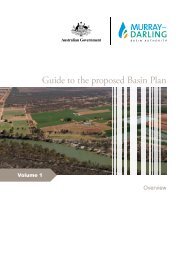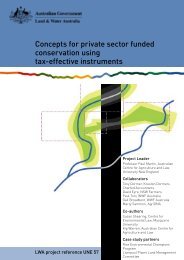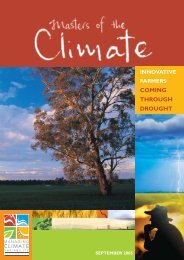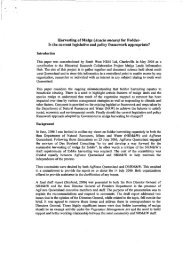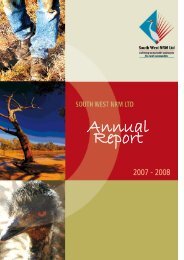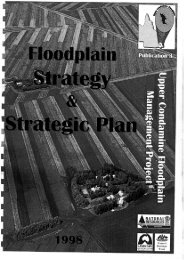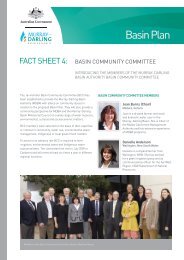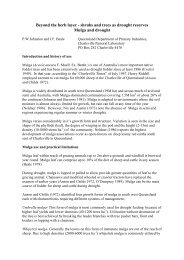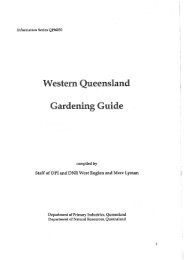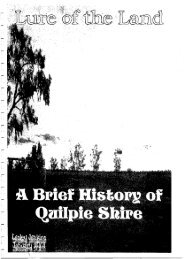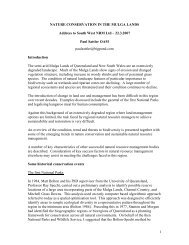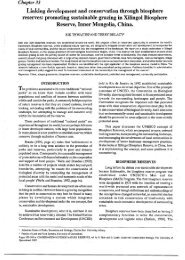soil-conservation-people-religion-and-land.pdf - South West NRM
soil-conservation-people-religion-and-land.pdf - South West NRM
soil-conservation-people-religion-and-land.pdf - South West NRM
You also want an ePaper? Increase the reach of your titles
YUMPU automatically turns print PDFs into web optimized ePapers that Google loves.
The stages of cultural <strong>and</strong> ecological evolution<br />
Characteristic<br />
-.<br />
--- ~kitive Frontier or industrial Spaceship<br />
Relationship<br />
to nature<br />
- Ma-in nature<br />
but controlled by<br />
nature<br />
Man vs.nature:<br />
increased control<br />
Man vs. nature:<br />
attempt at complete<br />
control<br />
-<br />
. -- -<br />
Earthmanship<br />
Man <strong>and</strong> nature:<br />
Selective control<br />
- -<br />
Goals Survival Sum'val, high<br />
st<strong>and</strong>ard of living<br />
Survival, high<br />
st<strong>and</strong>ard of living<br />
Survival, high<br />
quality of life<br />
Method<br />
Try to secure<br />
enough food,<br />
clothes, & shelter<br />
to stay alive<br />
Produce, use, acquire<br />
as much as possible<br />
in one's lifetime<br />
Complete technological<br />
<strong>and</strong> social control of<br />
nature <strong>and</strong> man to<br />
avoid exceeding the<br />
limits of the earth<br />
Selective control<br />
based on ecological<br />
underst<strong>and</strong>ing,<br />
diversity, harmonious<br />
collaboration,<br />
<strong>and</strong> m'ng to avoid<br />
exceeding the limits<br />
of the earth.<br />
Social<br />
units<br />
Individual, tribe<br />
Family, community,<br />
corporation, nation<br />
Family, community,<br />
earth<br />
Family, community,<br />
earth<br />
Reward Staying alive Profit, efficiency,<br />
power<br />
Survival, comfort,<br />
power<br />
Survival, joy, a<br />
purpose to life<br />
Population Reproduction ~eprodudion Reproduction Reproduction<br />
to survive determined by controlled by controlled by a<br />
economic & social the state balance of voluntary<br />
factors<br />
action <strong>and</strong> mutual<br />
coercion through laws<br />
Environ- Not always a A free good b be A basic concept A basic concept<br />
mental meaningful idea used <strong>and</strong> abused of critical value of critical value<br />
quality<br />
at will<br />
Progress from the frontier mentality to the desired<br />
earthmanship, is explained by Tyler Miller (1975) in the<br />
accompanying table.<br />
In most of Man's developmental endeavours affecting the<br />
l<strong>and</strong>, the economic, political <strong>and</strong> technical feasibility have<br />
been the prime evaluative criteria of whether projects are<br />
feasible. Caldwell (1975) suggests that if Man is to survive<br />
his own environmental disasters, then ethical<br />
considerations, should be central to decision making as<br />
shown in his feasibility circle:<br />
environmental<br />
forgotten there is any such thing as l<strong>and</strong>, among whom<br />
education <strong>and</strong> culture have become almost synonymous<br />
with l<strong>and</strong>lessness. This is the problem of '<strong>conservation</strong><br />
education'.<br />
When one considers the prodigious achievements of the<br />
profit motive in wrecking l<strong>and</strong>, one hesitates to reject it as a<br />
vehicle for restoring l<strong>and</strong>. I incline to believe we have<br />
overestimated the scope of the profit motive. Is it profitable<br />
for the individual to build a beautiful home? To give his<br />
children a higher education? No, it is seldom profitable, yet<br />
we do both. These are, in fact, ethical <strong>and</strong> aesthetic<br />
premises which underlie the economic system.<br />
No ethical <strong>and</strong> aesthetic premise yet exists for the<br />
condition of the l<strong>and</strong> these children must live in. There is as<br />
yet no social stigma in the possession of a gullied farm, a<br />
wrecked forest, or a polluted stream, provided the dividends<br />
suffice to send the youngsters to college.<br />
What <strong>conservation</strong> education must build is an ethical<br />
underpinning for l<strong>and</strong> economics <strong>and</strong> a universal curiosity to<br />
underst<strong>and</strong> the l<strong>and</strong> mechanism. Conservation may then<br />
follow." (Aldo Leopold, 1953).<br />
economical<br />
tec hnoloqical<br />
Let us consider the words of Aldo Leopold:<br />
"Conservation is a state of harmony between men <strong>and</strong><br />
l<strong>and</strong>. By l<strong>and</strong> is meant all the things on, over, or in the earth.<br />
Harmony with l<strong>and</strong> is like harmony with a friend; you cannot<br />
cherish his right h<strong>and</strong> <strong>and</strong> chop off his left.<br />
The problem, then, is how to bring about a striving for<br />
harmony with l<strong>and</strong> among a <strong>people</strong> many of whom have<br />
A theology of the l<strong>and</strong> +<br />
The use of moral obligations as a means of gaining cooperation<br />
in l<strong>and</strong>care has not been widely applied in<br />
Australia. In the United States the pulpits of country<br />
churches were used by the 'father of <strong>soil</strong> <strong>conservation</strong>'<br />
Hugh Bennett in the 1940s. "Big Hughie" made it very clear<br />
to his congregation that it was nothing less than our<br />
Christian duty to preserve the l<strong>and</strong> <strong>and</strong> keep it fruitful. Elliot<br />
(1978) the Australian philosopher makes a crucial point<br />
when he challenges our Samaritanism towards the l<strong>and</strong>:<br />
"When we see someone being exploited, our response as<br />
Christians ought to be to mirror God's concern for the


